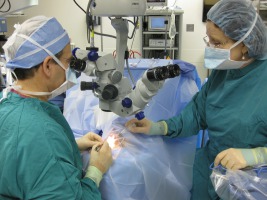
CATARACT
Cataracts occur when changes in the lens of the eye cause it to become less transparent (clear). This results in cloudy or misty vision.
The lens is the crystalline structure that sits just behind your pupil (the black circle in the centre of your eye).
Cataracts sometimes start to develop in a person's lens as they get older, stopping some of the light from reaching the back of the eye.
Over time, cataracts become worse and start to affect vision. Eventually, surgery will be needed to remove and replace the affected lens.
Symptoms of cataract
As cataracts develop over many years, problems may be unnoticeable at first. Cataracts often develop in both eyes, although each eye may be affected differently.
You'll usually have blurred, cloudy or misty vision, or you may have small spots or patches where your vision is less clear.
Cataracts may also affect your sight in the following ways:
- you may find it more difficult to see in dim or very bright light
- the glare from bright lights may be dazzling or uncomfortable to look at
- colours may look faded or less clear
- everything may have a yellow or brown tinge
Cataracts aren't painful and don't irritate your eyes or make them red.
Who's affected
Cataracts are very common and they're the main cause of impaired vision worldwide.
In the UK, most people who are aged 65 or older have some degree of visual impairment caused by cataracts. Men and women are equally affected.
As the exact cause of age-related cataracts isn't clear, there's no known way to prevent them.
Treating age-related cataracts
If your cataracts aren't too bad, stronger glasses and brighter reading lights may help. However, as cataracts get worse over time, it's likely that you'll eventually need treatment.
Surgery is the only type of treatment that's proven to be effective for cataracts. It's usually recommended if loss of vision has a significant effect on your daily activities, such as driving or reading.
Cataract Surgery (Phacoemulsification)
This is a highly successful operation that involves removing the cloudy lens through a small incision in your eye and replacing it with a clear, plastic one. In most cases, the procedure is carried out under local anaesthetic (where you're conscious, but the eye is numbed with drops) and you can go home the same day. Intravenous sedation provided by an anaesthetist, calms anxiety.
